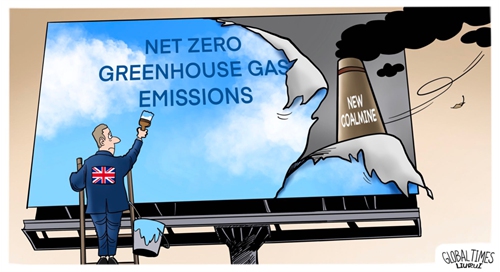
Pro-Trump supporters storm the US Capitol following a rally with President Donald Trump on January 6, 2021 in Washington, DC. Trump supporters gathered in the nation's capital to protest the ratification of President-elect Joe Biden's Electoral College victory over President Trump in the 2020 election. Photo: Samuel Corum/Getty Images/VCG
In the face of the growing violent extremism, it is difficult for the West to escape the dead end of ineffective governance. The rise of extremism is only one symptom of the gradual failure of Western governments. What is behind such ungovernability is also a loss of order.Europol warned Monday that the threat of violent attacks by right-wing extremists in transnational online communities is increasing, after an operation that found more than 800 cases of violence or terrorist content.
The European policing agency also noted that the recent shootings in Buffalo, the US, in May and Bratislava, Slovakia, in October "illustrated a concerning proliferation of violent right-wing extremist and terrorist activities on a global scale." "The perpetrators of these attacks were part of transnational online communities and took inspiration from other violent right-wing extremists and terrorists," Europol added.
The Global Terrorism Index 2022 report shows that the West is witnessing a significant increase in politically motivated attacks - 73 percent of attacks in the West now are attributed to politically motivated groups and individuals. In particular, the US suffered from a significant increase in domestic terrorism in 2022. The US Department of Homeland Security reissued its National Terrorism Advisory System Bulletin in June, warning chances of escalated violence or terror attacks were likely to grow in the coming six months.
For the far right in Europe, the surge of domestic terrorism in the US provides a model that can be learned or directly copied from. Extremism has spread from one side of the ocean to the other at an unprecedented speed with the help of new technologies in the internet age, threatening the safety of people in the West and all around the world.
One example of how US extremists impact their European counterparts would be the arrest of 25 alleged coup plotters earlier this month in Germany. According to BBC, the suspects include members of the extremist "Reichsbürger" movement, which has long been in the sights of German police over violent attacks and racist and anti-Semitic conspiracy theories, and believers of the QAnon conspiracy, which gained popularity online in the US in recent years.
"Some years ago, it was unimaginable for anyone to think of violent overthrow of governments in Western Europe or North America. The coup was not part of the political dictionary in these countries. But that is changing rapidly," wrote European scholar Ashok Swain last week.
"I am worried that if the right-wing extremists take up a larger share of the political parties in many European countries, or even become a ruling party alone, there is a risk that some of these nations may go back on the fascistic road again, just like they did in World War II. In that case, it would be a great disaster," Chinese military expert and TV commentator Song Zhongping told the Global Times.
The West now faces many deep-seated crises, be they economic, social or political. As divisions between classes widen and become more polarized, Western societies often find themselves struggling to form a consensus. At the same time, governments fail to find ways to solve problems in a reasonable and effective manner. As a result, it is easy to breed violence and extremism.
According to Zhao Junjie, a research fellow at the Chinese Academy of Social Sciences' Institute of European Studies, Western political elites are elected in "democratic" elections, but they cannot make decisions for the people and usually face a governance crisis. These politicians lack the grand vision of a strategist and the capability of rational thinking when dealing with problems. Therefore, such a leaderless West has given extremists, eager to show their presence by stirring up trouble, the opportunity to "shine" on its stage.
Now Western democracy has degenerated into political polarization, which may lead to the revival of a series of dangerous concepts like Nazism and militarism, to name a few. This could bring Western and especially European societies to more significant social unrest and even put the continent back on the brink of falling apart.
Western political elites know that the West now needs a major reform. But such changes can easily shake the fundamentals of the rule of Western elites. A dilemma is lying in front of these politicians.
In the midst of the constant struggle with extremism, the West has to seek a balance of interests and social stability. Extremism will only slowly begin to die down after the currently chaotic Western politics return to normal and more capable politicians that can control the situation emerge in the West.



